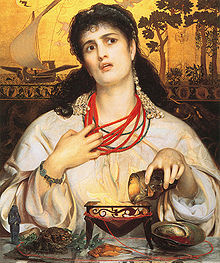Aristotle, author of many works on many different topics.
The earliest surviving work of dramatic and literary theory, Aristotle's Poetics, examines what exactly drama and poetry are as well as what makes for a good story. Aristotle identified six elements of tragedy (the focus of the selection in the Norton anthology): plot, character, language, thought, spectacle and melody. He also examines what doesn't work in plots and character development (just because it focuses on one character does not make it unified, stay away from episodic plots) and what should be done (if you have to do things that are outside of the realm of normal events, make it happen off stage). It ends with a brief discussion on the role of the chorus and how it should behave like a normal actor instead of just being there to distract the audience.
It's interesting to see Aristotle critique the plays and poems that I just spent two months or so reading. It provides an extra layer of depth beyond a very shallow understanding you get if you have no idea what he's referring to. Plus since his description critiqued and commented on actual elements of the performance of the plays, it helps with visualization.


.jpg)



